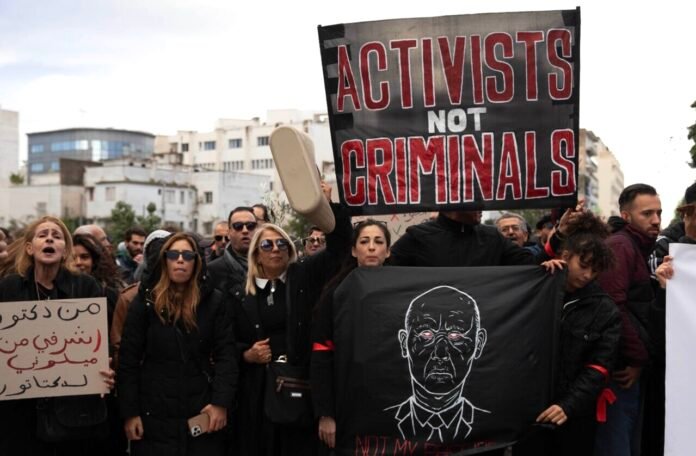A Tunisian appeals court has issued prison sentences ranging from five to 45 years against dozens of political opponents, business figures, and lawyers—marking one of the most sweeping political prosecutions since the country’s 2011 revolution. The decision, confirmed in court documents made available on Friday, has intensified fears that President Kais Saied is steering Tunisia toward increasingly authoritarian rule.
The case involved 40 defendants accused of conspiring to overthrow the president. Twenty of them were tried in absentia after fleeing abroad, underscoring the climate of fear that has grown among critics and former officials.
Broad Range of Sentences, Including Against Well-Known Political Figures
Among those sentenced were several prominent opposition leaders. According to defence lawyers:
Ghazi Chaouachi, Issam Chebbi, Jawahar Ben Mbarek, and Ridha Belhaj each received 20-year prison terms.
Noureddine Bhiri, a leading figure in the Ennahda movement, received 10 years.
Chaima Issa, a key voice in the National Salvation Front, was sentenced to 20 years.
Nejib Chebbi, head of the National Salvation Front coalition, received 12 years.
Ayachi Hammami, a human rights lawyer, received five years.
While some of these figures were already detained following arrests in 2023, others remain free for the moment. Lawyers say authorities are expected to enforce their imprisonment soon.
The heaviest sentence—45 years—was handed to influential businessman Kamel Ltaif, long considered a powerful figure in Tunisia’s political landscape. Opposition politician Khyam Turki was sentenced to 35 years.
Government Accuses Defendants of Destabilising the State
Tunisian authorities have defended the trial, claiming the group sought to undermine national stability and remove Saied from power. The accused include former senior officials and state security figures, including ex-intelligence chief Kamel Guizani.
But lawyers and rights advocates argue the proceedings lacked fairness.
“This is a judicial farce,” defence attorney Mokthar Jmai said, alleging the charges were aimed at eliminating Saied’s rivals rather than protecting national security.
Rights Groups Warn of Deepening Repression
Organisations including Human Rights Watch and Amnesty International say the prosecution reflects a sharp escalation in political repression. Since President Saied’s 2021 power grab—when he dissolved parliament, suspended large parts of the constitution, and began ruling by decree—the government has detained critics, journalists, judges, and civil society leaders. Independent NGOs have faced suspension or legal restrictions.
Rights groups argue that the judiciary has effectively been placed under presidential control since Saied dissolved the Supreme Judicial Council in 2022 and dismissed dozens of judges, moves widely seen as undermining judicial independence.
Opposition Planning Unified Response
Opposition parties, though historically fragmented, say they now plan to close ranks in response to what they describe as a systematic political purge. Leaders argue the convictions are fabricated and designed to silence dissent ahead of future political contests.
President Saied has previously dismissed criticism, calling his opponents “traitors and terrorists” in 2023, and warning that any judge who acquits them would be considered complicit.
The mass sentencing is likely to heighten tensions in Tunisia at a time when the country faces economic strain, dwindling foreign investment, and growing public frustration.
Source:Africa Publicity








